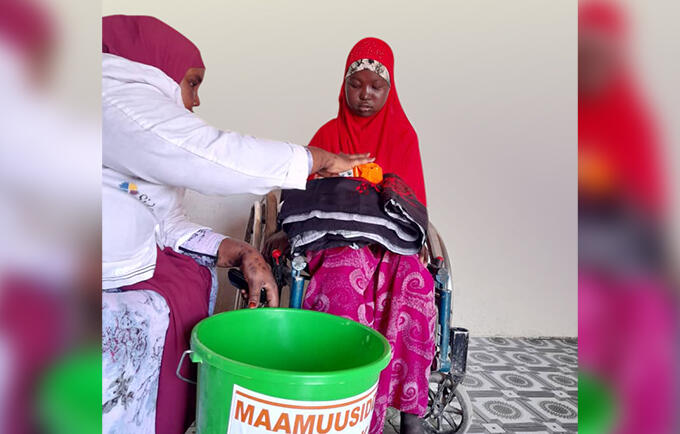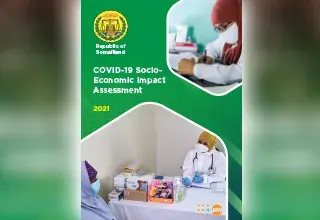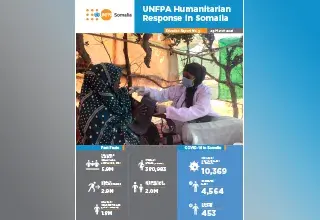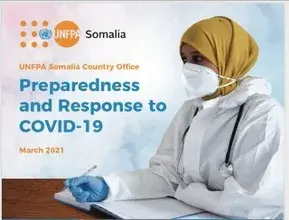At a very tender age of four, Fardowsa Ahmed from Galkacyo was infected by polio, a disabling and life-threatening disease caused by the poliovirus. She was never taken to the hospital for treatment as her mother did not realize the seriousness of the problem. Fardowsa lost the use of both her hands and legs.
"I was being discriminated against even by fellow children. They did not want to include me in any activities," said Fardowsa.
Due to the discrimination, her mother did not send her to school. She also had problems moving around. "My family is very poor, and my mother only managed to get me a wheelchair at the age of 13," Fardowsa said.
Fardowsa's mother, Kalsoon, is a single parent with two children; the youngest is only four years old. Kalsoon depended on agricultural activities to earn a living.
The family was affected by drought, and they couldn't cope with the scarcity of water, depletion of pasture and livestock. Kalsoon ended up moving her family into a settlement for Internally Displaced Persons (IDPs).
The current humanitarian situation has not helped matters; Somalia continues to face complex and protracted humanitarian crises due to the coronavirus pandemic, climate-related shocks namely floods, drought, cyclone, desert locusts, conflict and the protracted situation affecting internally displaced persons (IDPs).
Now at the age of 14, Fardowsa's personal needs have increased. She's reached puberty and requires menstrual hygiene products.
Loss of livelihoods and food insecurity, especially among female-headed households and other vulnerable women and adolescent girls, have worsened food aid dependency and humanitarian assistance.
UNFPA Somalia continues to provide access to life-saving integrated Sexual and Reproductive Health (SRH), and Gender-Based Violence (GBV) services, including the provision of COVID-19 adapted dignity kits.
As part of the response to women and girls' specific needs, UNFPA Somalia and its partner Somali Birth Attendants Cooperative Organisation (SBACO) has distributed 300 dignity kits to marginalized women and girls in the surrounding areas of Galkacyo. Fardowsa and Kalsoon have benefited from the intervention.
"Beneficiary checklists were cross-checked to avoid the same person, or same household receiving multiple kits in line with a strict information sharing protocols for the protection of sensitive data," said SBACO Program coordinator Hinda Abdi Muse.
Kalsoon is thankful to SBACO and UNFPA Somalia. "All the dignity kits that UNFPA distributed through SBACO suit our needs. We received sanitary pads, soap for washing, underwear, antibacterial surface cleaning solution for hands and hand sanitiser," said Kalsoon, adding: "I used to spend $3 just to soap. We used to collect dirty and unwanted clothes from the neighbours to use as sanitary pads."
Women and girls with disabilities face significantly more difficulties and double discrimination, which places them at higher risk of gender-based violence, sexual abuse, neglect, maltreatment and exploitation.
Emergencies disrupt daily life and often cause the displacement of populations, with the loss of many of their possessions. During these emergencies, women and girls face several needs, threats and situations which must be considered in any response.
"COVID-19 in Somalia has really exposed the protection needs of vulnerable women and girls. Those in the camps for internally displaced persons and hard to reach areas are most affected. UNFPA Somalia and its partners prioritize to address the needs of vulnerable women and girls, including persons with disabilities, displaced people and GBV survivors. Services provided include psycho-social support, case management, clinical management of rape, dignity kits and referrals," said Ridwan Abdi, UNFPA Humanitarian Specialist.
He said preserving dignity is essential to maintaining self-esteem and confidence, critical to coping in stressful and potentially overwhelming humanitarian situations. Women and girls need essential items to interact comfortably and safely in public. "They also need access to personal hygiene, particularly menstrual hygiene. Without access to culturally appropriate clothing and hygiene items, the mobility of women and girls is restricted. Their health and safety can also be compromised. As a result, they might be unable to seek basic services, including humanitarian aid," said Abdi.
-------Dr Abdullahi Abdirasak





